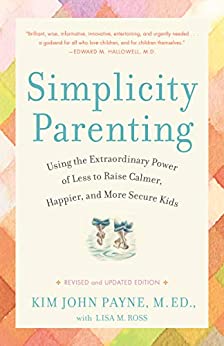More on this book
Community
Kindle Notes & Highlights
Read between
May 17 - August 15, 2021
One restful, simplified weekend is usually enough to make the difference, to break a soul fever.
Nature is a warm sensory bath that can counterbalance the cold overwhelm of too much activity, information, or “stuff.” Time in nature calms and focuses; for most children, it takes only a few minutes for them to begin to explore.
Children need experience, not entertainment, in play. The more kids can do, see, feel, and experience for themselves in play, the more connected they will feel to the world, and the less overwhelmed.
Louv offers scientific evidence for what most of us know intuitively: that time in nature is restorative, that it helps us recover from the stresses of daily life and improves our capacity to pay attention.
Too much stimulation causes sensory overload. Adjust the tone and volume not only of sounds but also of smells and light in your home.
For kids who are studying an instrument, after breakfast can be a good time to practice.
Children who’ve had a role in preparing a meal assume ownership of it. More simply: When children make the food, they’re less likely to throw it or refuse
If you want your child to try a new food (or food group), you need to have them try it at least eight times.
At the end of the day, when Henry was getting ready for bed, she would lie on his bed and begin with a question. “Henry, love, what was a good thing, a courageous thing about the day?”
What was the hardest thing today?”
Most kids older than six won’t sleep during rest time, and if they do, it’s because they really need more sleep than they’re getting. But a half hour or an hour of quiet, restful solitary time during the day is restorative at any age and a habit worth cultivating.
For some boys and industrious types, work can serve as a pressure valve. Such work might be doing a project: hauling rocks in a wheelbarrow, digging a hole, building with blocks, catching lizards, or climbing a tree.
However, given how reachable and distractible we are, you might question how “available” we really are at any moment. Surely if you’re fully available to the person on the phone, you can’t be to those you’re with, and vice versa.
They each had to take one entire season—fall, winter, spring, or summer—off, with no sports involvement during that time. And each child was responsible for researching and networking car-pool possibilities for their sport’s season.
The younger the child, the more free time he or she needs.


